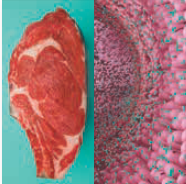A recent study by Tufts researchers and colleagues looked at the dietary habits of nearly 4,000 participants aged 65 and older and measured the level of specific metabolites in their blood. Atherosclerotic cardiovascular disease (ASCVD) events—like heart attacks and strokes—were recorded over 12.5 years follow-up.
After adjusting for sociodemographic factors, lifestyle, and dietary factors, higher intake of red meat was associated with higher risk of ASCVD. Intakes of fish, poultry, and eggs were not significantly associated with risk. The study then looked at participants’ blood levels of metabolites (byproducts) that are known to be synthesized by gut bacteria. These included TMAO (trimethylamine N-oxide), an end-product of the breakdown of L-carnitine, a molecule found in red meat and other animal foods, and other related metabolites. In this study, people who regularly consumed more red meat, but not fish, poultry, and eggs, had higher levels of TMAO in their blood. Analysis suggested that TMAO and other metabolites that result from gut microbes breaking down L-carnitine may play a larger role in meat-ASCVD associations than blood pressure or blood cholesterol levels.
This study highlights one important way high intake of red meat may increase risk for cardiovascular disease, supporting the idea that our gut microbiota and the metabolites they generate from the foods we eat are key players in our health.
























